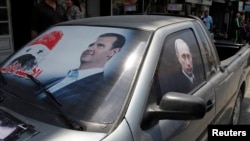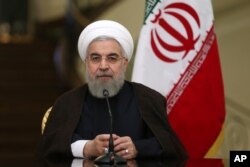Russian President Vladimir Putin and his Iranian counterpart, Hassan Rouhani, have told U.S. media outlets that embattled Syrian President Bashar al-Assad must remain in power to fight terrorism.
U.S. ambassador to the United Nations Samantha Power said Assad’s presence attracts foreign fighters to Syria.
Speaking to CNN on Sunday, Rouhani said that in driving out terrorists in Syria, “we have no solution other than to strengthen the central authority of that country.”
“Everyone has accepted that President Assad must remain so we can combat terrorists," he said.
Rouhani also told NPR that Tehran is prepared to start holding discussions and dialogues on a post-Islamic State Syria, but those fighting the extremist group “must all act in unison and have a formula to drive out the terrorists, immediately.”
'Legitimate government'
In a separate interview with CBS, Putin said he supports “the legitimate government of Syria.”
The Russian leader warned any actions to destroy it “will create a situation which you can witness now in the other countries of the region … where all the state institutions are disintegrated.”
"There is no other solution to the Syrian crisis than strengthening the effective government structures and rendering them help in fighting terrorism," he said.
Appearing Sunday on ABC’s This Week, Power was asked if President Barack Obama could be comfortable with Assad remaining in office.
"The challenge with Assad, in addition to the fact that he gasses his own people and uses barrel bombs, and we haven’t seen a dictator like him in a very long time, put that all to one side, the other challenge is he hasn’t been all that effective fighting ISIL (Islamic State)," she said.
"In fact, the presence of Assad has attracted foreign terrorist fighters. We are targeting them. We are having good success, particularly in the northern part of the country, actually blunting ISIL’s progress and rolling them back," Power said, using an acronym for the Islamist group.
US-backed forces
On Friday, U.S. defense officials said members of the U.S.-trained New Syrian Force (NSF) gave the al-Qaida-linked al-Nusra Front six pickup trucks and ammunition that had been supplied by the U.S.-led coalition in exchange for safe passage.
The train-and-equip program has been plagued by problems, according to analysts and U.S. lawmakers, since it was announced last year as part of Washington's strategy to defeat the Islamic State group by using indigenous forces.
Congress allocated $500 million with the aim of training as many as 15,000 moderate fighters to combat the Islamic State group in Syria.
In July, al-Nusra abducted a commander and seven fighters from the program's first graduates, just days after they deployed in Syria.
U.S. Central Command chief General Lloyd Austin told U.S. lawmakers last week no more than five U.S.-trained Syrian fighters were left from the initial graduates. He acknowledged the program may be overhauled.
Necessary
Ambassador Power defended the train-and-equip program as necessary.
"When ISIL is cleared from a town, it’s extremely important that the town be held and ISIL not reoccupy it as soon as the airstrike or something ceases," she said.
She called it a critical part of U.S. strategy, adding the Pentagon will be looking at adjustments to the program.
In an interview in Moscow last week, excerpts of which were made available Sunday, President Putin denounced U.S. support of Syrian rebels.
"In my view, [providing] military support to illegitimate structures is not in keeping with the principles of modern international law or with the United Nations charter. We support only legal and governmental structures," he said.
Regarding the Russian military presence in Syria, Putin told CBS that Russia has no plans to deploy combat troops, at least for the time being.
The Russian leader also said Moscow is intensifying its work with both President Assad and Russia's other partners in the region.
'Not good news'
Jonathan Adelman, regional analyst at the University of Denver, said this is not good news for the Obama administration.
"We know he’s [Putin’s] planning in this new [Syrian] airbase to somewhere between a thousand and 2,500 [troops] on the ground and given the fact that Russian troops are, perhaps not at the American level, but they’re at a decent level, they’re certainly at a much better level than the Iranian forces, they could be a significant factor," Adelman said.
"it’s not just Bashar [al-Assad] who’s going to stay in power forever, at this rate unfortunately, it very much may well be that Russia is back [in the region]. ... They’re back, and that is not good news for the [Obama] administration," he said.
Meanwhile, Iraq said it will be sharing security and intelligence information with Russia, Iran and Syria in the fight against the Islamic State group.
Adelman said some countries in the region would prefer working with the United States, but they see no alternative than to cooperate with Russia.












